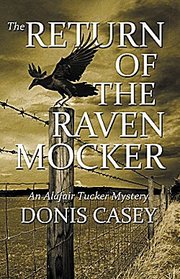Set in Oklahoma in the early 1900s, this is the ninth in the series featuring Alafair Tucker. I like it for its sense of place and time - Casey does a great job delineating what it might have been like to farm near a small town a hundred years ago. Alafair tends her house and her ten kids, her husband farms and tends his family. In this book, it's 1918; the Tucker boys are fighting overseas in WWI. The town is doing what it can to prepare for the flu epidemic, but when it hits it's very bad. Alafair moves into town to care for her stricken daughter. When death occurs next door, Alafair goes to render what aid she can...but she is pretty sure these deaths were not from the flu.
This book felt so real to me. The fear of infection, the lack of medical personnel, the folk remedies, and the depiction of what must have been just exhausting battles every day to keep death at bay. I loved Alafair's competence in taking care of people and her absolute determination to never give up. The mystery element here isn't the main theme of the book, and maybe the mystery isn't the strongest one in the series, but it is still interesting. Casey provides us several suspects before we get to the end.
New readers could start here as there is a helpful list of characters and their relationships in the front. But I'd recommend starting from the beginning of the series, it's well worth it.
This book felt so real to me. The fear of infection, the lack of medical personnel, the folk remedies, and the depiction of what must have been just exhausting battles every day to keep death at bay. I loved Alafair's competence in taking care of people and her absolute determination to never give up. The mystery element here isn't the main theme of the book, and maybe the mystery isn't the strongest one in the series, but it is still interesting. Casey provides us several suspects before we get to the end.
New readers could start here as there is a helpful list of characters and their relationships in the front. But I'd recommend starting from the beginning of the series, it's well worth it.
I will always-- always-- enjoy an Alafair Tucker novel written by the talented Donis Casey, and I did enjoy The Return of the Raven Mocker, but it's not the strongest book in this wonderful series. It is more historical fiction than historical mystery, with Casey doing a powerhouse job of showing the effects of the flu pandemic in Boynton, Oklahoma. For instance, despite people's best efforts to quarantine the entire town, people were so desperate for news from their men fighting overseas that they were willing to risk infection and even death just to get the mail.
Casey also does a wonderful job showing how old wives' tales and folk remedies worked side by side with modern medicine to fight influenza. In fact, I was so exhausted by the endless hours of nursing Alafair and her daughter Martha did that I fell for every murder suspect put before me until just before the end (just in time to make me feel smart).
In a book filled with sickness, despair, and exhaustion, Alafair's young daughter Sophronia was just about the only bright spot in the entire book. The Return of the Raven Mocker may not be a completely satisfying mystery, but it is a worthy addition to the series and continues the storylines of characters fans have come to love.
Casey also does a wonderful job showing how old wives' tales and folk remedies worked side by side with modern medicine to fight influenza. In fact, I was so exhausted by the endless hours of nursing Alafair and her daughter Martha did that I fell for every murder suspect put before me until just before the end (just in time to make me feel smart).
In a book filled with sickness, despair, and exhaustion, Alafair's young daughter Sophronia was just about the only bright spot in the entire book. The Return of the Raven Mocker may not be a completely satisfying mystery, but it is a worthy addition to the series and continues the storylines of characters fans have come to love.




